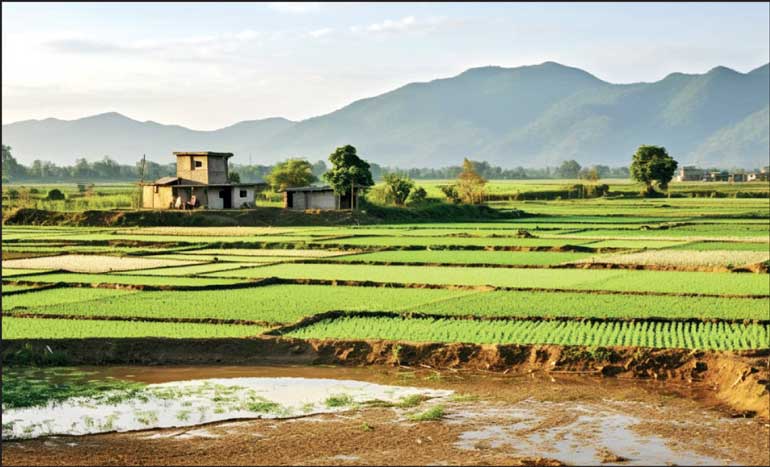Monday Feb 16, 2026
Monday Feb 16, 2026
Tuesday, 20 June 2023 00:00 - - {{hitsCtrl.values.hits}}

Closing knowledge gaps across all parts of the adaptation policy cycle is vital to enhance effective, context-specific, and relevant adaptation action
 Climate change is one of the defining global challenges of our time. The world urgently needs to reduce greenhouse gas emissions to curb global warming to below 1.5 or 2 degrees Celsius, and it needs to address those climate-related impacts that are already taking place, which are summarised under the label of “loss and damage.” In between this, climate change adaptation can help households, communities, and countries to minimise or avoid some of the impacts of climate change or even allow them to seize opportunities and strengthen their livelihoods, wellbeing, and overall resilience.
Climate change is one of the defining global challenges of our time. The world urgently needs to reduce greenhouse gas emissions to curb global warming to below 1.5 or 2 degrees Celsius, and it needs to address those climate-related impacts that are already taking place, which are summarised under the label of “loss and damage.” In between this, climate change adaptation can help households, communities, and countries to minimise or avoid some of the impacts of climate change or even allow them to seize opportunities and strengthen their livelihoods, wellbeing, and overall resilience.
Climate change adaptation, as defined by the Intergovernmental Panel on Climate Change (IPCC), describes “the process of adjustment in human or natural systems to actual or expected climate and its effects, in order to moderate harm or exploit beneficial opportunities.” Basically, this means that adaptation allows a given system to keep its function and structure intact in the face of far-ranging environmental changes, or to transform itself to adjust to these new circumstances.
Adaptation is usually planned and coordinated at the national level, where the adaptation policy cycle can be seen as an overall structure. National Adaptation Plans (NAPs) as well as other national plans, policies, strategies, and legal instruments together create an enabling environment for the implementation of adaptation action in different sectors and at different levels.
Identifying knowledge gaps
The adaptation policy cycle on the national level consists of four phases: assessment, planning, implementation, and monitoring, evaluation, and learning. Across all these phases, there is a need to have relevant, reliable, and context-specific data, information, and knowledge that can guide climate change adaptation from the first scoping to final impact assessment. However, there are gaps in the availability of this knowledge, which can often make it difficult to plan and implement adaptation actions in a targeted and effective manner. Therefore, it is vital to identify existing knowledge gaps and work towards closing them.
Available data and information are often fragmented and not easily accessible in a common form and through a central system. Different institutions and stakeholders collect information—for example, on climate, weather, agricultural productivity, or household characteristics—, but this information is not shared or pooled, and often not compatible with each other. This could be addressed through common data formats, data-sharing protocols, joint forums, a central database or knowledge hub, and enhanced coordination and integration at the national and sectoral level.
Beyond national-level data, there are also knowledge gaps when it comes to local, context-specific, and intersectional vulnerabilities and needs for frontline communities. How are youth, women, the elderly, or those with disabilities affected by climate change? What are their capacities, and how could they be enhanced? What is the role of natural ecosystems when it comes to climate change adaptation, and how do human communities benefit from ecosystem services? What local and traditional knowledge is available on the ground, and how can it be integrated into adaptation planning?
In addition, knowledge gaps are often found in connection to resource mobilisation; the integration of climate change information into relevant climate change policies, strategies, and plans; technology needs; or monitoring, evaluation, and learning systems to track adaptation success and the progress of implementation, including cost/benefit analysis and impact assessments. Within sectors, there might be knowledge gaps on adaptive practices and their benefits, available technologies, forecast information, or how projected climate scenarios would concretely impact specific sectors or areas.
Overcoming knowledge gaps and scaling up adaptation
In general, key categories of adaptation knowledge can be categorised under data and science, technological know-how and technology, socio-economic understanding and vulnerabilities, and policy processes, specifically regarding implementation, monitoring, impact assessment, and learning.
Under the United Nations Framework Convention on Climate Change (UNFCCC) and the Paris Agreement, Parties and other stakeholders aim to identify and address these knowledge gaps on the global level, including through the work of the Adaptation Committee and the Nairobi Work Programme, which serves as a knowledge hub and facilitates the sharing of information, methods, and tools. Furthermore, processes such as the Global Goal on Adaptation and the Global Stocktake can provide entry points to identify, address, and overcome knowledge gaps and set relevant targets that can guide country-level actions.
Identifying and addressing climate change adaptation knowledge gaps can greatly help vulnerable developing countries like Sri Lanka, for example by reducing vulnerabilities, strengthening preparedness, informing policy development, allocate resources more efficiently, develop the necessary technology, access finance, and build relevant human and institutional capacities to systematically scale up systems of adaptation.
(The writer works as Director: Research and Knowledge Management at SLYCAN Trust, a non-profit think tank based in Sri Lanka. His work focuses on climate change, adaptation, resilience, ecosystem conservation, just transition, human mobility, and a range of related issues. He holds a Master’s degree in Education from the University of Cologne, Germany and is a regular writer to several international and local media outlets.)